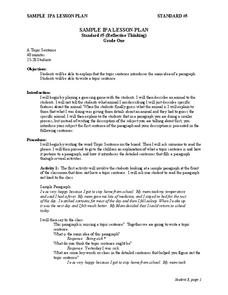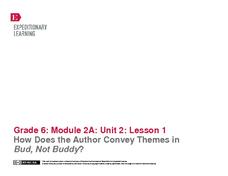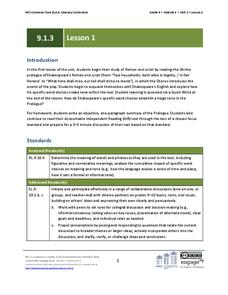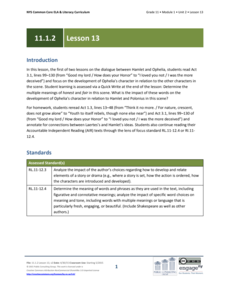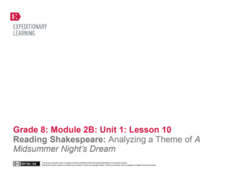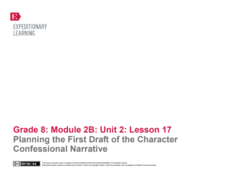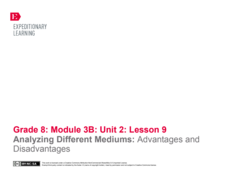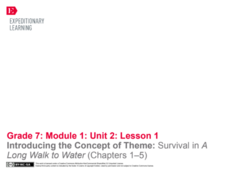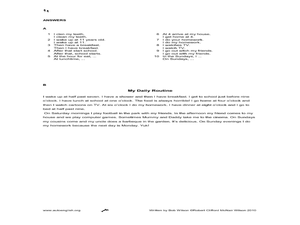Curated OER
Topic Sentence
Students write a topic sentence to a paragraph and explain that it introduces the main idea. After a whole-class demonstration, students write a complete paragraph with their topic sentence and supporting sentences. There are some...
Curated OER
With Your Own Two Hands: Are You Changing the World or "Waiting for the World to Change"?
Can your pupils change the world? Explore this question with Ben Harper's song "With My Own Two Hands" and John Mayer's "Waiting for the World to Change." After listening to the songs, they discuss the tools at their disposal for...
EngageNY
How Does the Author Convey Themes in Bud, Not Buddy?
After reading up to chapter 12 of Bud, Not Buddy by Christopher Paul Curtis, scholars read chapter 13 and take part in a grand conversation about the author's writing techniques. Pupils discuss how his writing conveyed literary themes...
EngageNY
Grade 9 ELA Module 2, Unit 2, Lesson 2
Continue a thoughtful analysis of Sophocles' Oedipus the King by discussing the importance of dialogue within the play's structure. Ninth graders examine how Oedipus speaks about himself to his subjects and Creon before recording their...
Scholastic
Dr. Seuss Extension Activities
Extend the exhilarating learning experience of Dr. Seuss with five activities designed to reinforce literacy skills—site word reading, dialogue writing, story mapping, and more! Featured stories include The Lorax, Horton Hears a Who, The...
EngageNY
Grade 10 ELA Module 4: Unit 2, Lesson 9
How does Shakespeare develop the central idea of agency versus fate in Macbeth? Using the resource, pupils work in small groups to discuss the plot of Act 3.1. Next, they complete a brief writing assignment to analyze how the main idea...
EngageNY
Grade 11 ELA Module 1: Unit 2, Lesson 20
How does the setting impact other elements within a play? Using a helpful resource, scholars explore the question by completing a Quick Write after reading Act 5.1 of Shakespeare's Hamlet. Additionally, they engage in a whole-class...
Teach-nology
Author’s Purpose: Entertain
How does an author entertain his or her audience? Read a short fairy tale and find the most evocative passages to discover more about author's purpose in narrative writing.
EngageNY
Grade 9 ELA Module 1: Unit 3, Lesson 1
Class members begin their study of Romeo and Juliet by examining the words Shakespeare chooses in the Prologue to Act I to create the tragic tone of his famous play about star-crossed lovers.
EngageNY
Grade 9 ELA Module 1: Unit 3, Lesson 17
Romeo and Juliet, Act 5, Scene 3, lines 139-170, is the focus of this day's lesson plan. Readers examine the dramatic irony in Juliet's comments and consider how "lamentable chance" caused by a "greater power" plays a role in the tragedy.
EngageNY
Grade 9 ELA Module 1: Unit 3, Lesson 20
The final session in this 20-lesson plan unit asks individuals to use their Quick Writes, discussion notes, worksheets, and annotated text to craft and support a claim about how Shakespeare develops either Romeo or Juliet as tragic heroes.
EngageNY
Grade 11 ELA Module 1: Unit 2, Lesson 13
What impact does word choice have on character development? Using the resource, scholars read Act 3.1 from Shakespeare's Hamlet, focusing on the development of Ophelia's character. They also complete a Quick Write to analyze the meaning...
EngageNY
Reading Shakespeare: Analyzing a Theme of A Midsummer Night’s Dream
After finishing Act I, scene 1 from Shakespeare's A Midsummer Night's Dream, class members study the theme of control as it relates to the play and start an Evidence of Control note-catcher worksheet.
EngageNY
Planning the First Draft of the Character Confessional Narrative
Scholars read and analyze a model character confessional narrative to help guide their writing. Then, they plan the first draft of a character confessional based on Shakespeare's A Midsummer Night's Dream.
EngageNY
Analyzing Different Mediums: Advantages and Disadvantages
How do authors play to people's moods? After briefly reviewing mood using a Conditional and Subjunctive Mood handout, learners practice identifying conditional and subjunctive sentences in the Montgomery Bus Boycott speech before reading...
EngageNY
Launching the Performance Task: Planning the Two-Voice Poem
Two voices, one poem. Scholars learn about and write a two-voice poem using graphic organizers, model poems, and guides. They practice reading poems with a partner and discuss how a poem of this type could help compare Salva and Nya in A...
EngageNY
Inferring Author’s Opinions and Writing Opinion Statements: Journalists’ Opinions about Segregation Post–World War II (Promises to Keep, Pages 22–25)
Let's play ball! Scholars summarize information from Promises to Keep about segregation in professional baseball after World War II. They then listen as the teacher reads pages 22-25 aloud. Pupils write the gist in their journals of the...
TV411
Whip up a Storm of Writing Ideas
Need a key to unlock writer's block? Introduce your writers to four easy steps that will release them from their mental prison. The brainstorming worksheet, designed to set free their imaginations, even has an answer key.
Curated OER
Monster: Guided Imagery
How would you feel if you were on trial for murder—and you were only 16 years old? Put yourself in Steve Harmon's shoes before reading Monster by Walter Dean Myers. Kids listen to music that fits the theme of the book before listening to...
I Think Diff
Arabic Translator - English Arabic Dictionary
Translate, practice, look-up, and play games with Arabic vocabulary. If you are searching for just about any word in English or Arabic, you will most likely find it here, accompanied by a translation and an audio clip of the pronunciation.
Curated OER
Role-Playing and Discovery: Literary Analysis
Introduce your class to the personal essay with this learning exercise. Learners identify the subject of an essay and then record examples from the essay that represent the author's thoughts and feelings regarding the subject. While this...
Curated OER
Word Play
Students define the steps of the formal writing process, consider the value and quality of the work done by Anne Frank in her personal diary, and create their own diary entries using the writing process outlined in class.
Curated OER
Daily Routine Writing Exercise
In this review of English usage activity, students correct grammatical mistakes, complete sentences with vocabulary words, and write about their daily routine. Students write 23 answers.
Curated OER
Checkmate: The Play's The Thing
Students investigate the Middle Ages and it's relation to the theater. For this acting lesson, students read Arthurian stories form the Middle Ages and practice using vocabulary words from the Medieval Times. Students write a play set...


